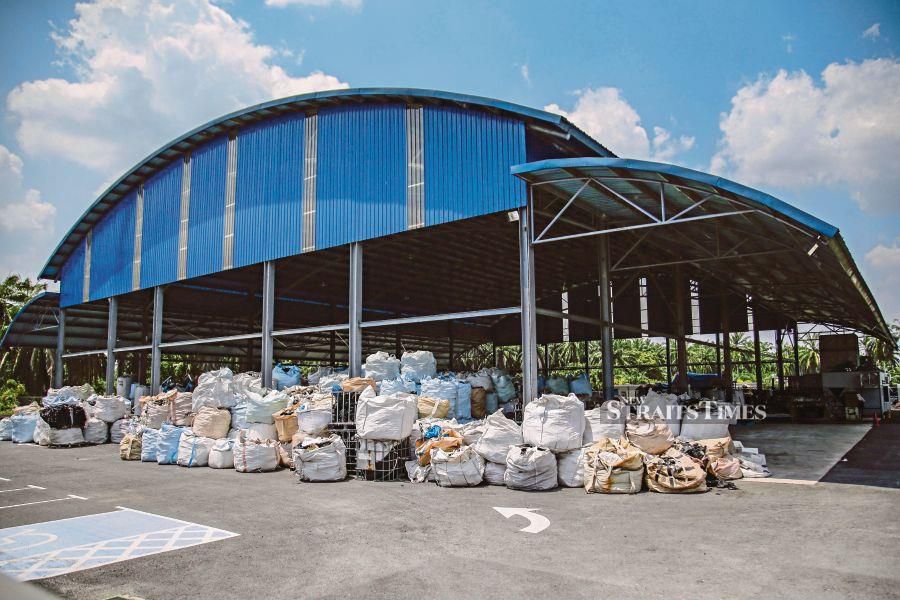Saying no to world's waste
Emeritus Professor Tan Sri Dato' Dzulkifli Abdul Razak
Opinion - New Straits Times
June 22, 2019

A plastic recycling factory in Kuala Langat, Selangor. Malaysia appears to be the dumping ground for plastic waste from ‘developed countries’. FILE PIC
MALAYSIANS seem to be inundated with news on unwanted plastics over the last few weeks. Instead of feeling that we are inching closer to a “developed” country status (despite the uncertainties) come 2020, the feeling is more of sinking into an underdeveloped one.
It is synonymous to a “dumping” ground for waste products from some other countries, not necessarily just recyclable plastics as claimed. More surprisingly, this apparently is not new. Just that it has been kept under wraps, like how “waste” is normally treated, away from prying eyes.
But the stench cannot be contained for too long as Malaysia competes to be the world’s capital for the dumping of waste products, notably notorious plastic scrap. Allegedly they are mostly discarded, if not toxic, contaminated items of low-quality originating from the supposedly “developed” countries.
Yes, developed countries — those that we aspire to become under the Wawasan 2020 framework. So what is the hurry then if a “developed” country still habours “underdeveloped” behaviour and habits? We are used to hearing about citizens from our neighbouring “first world” country littering and breaking rules when they cross over into Malaysia; but to have several containers of non-recyclable or non biodegradable plastic waste being “exported” here from places as far away as North America and Europe is just uncivilised.
More so when reportedly some of the plastic scrap that is allowed to be sent out are in violation of the Basel Convention, a United Nations treaty on the trade of plastic waste and their disposal. Some of the waste were purportedly even smuggled out from the country of origin to here.
In short, something is terribly wrong with the notion of a so-called “developed” country that most are dreaming of. Not only are they known to “over-consume” and “over-pollute”, creating unprecedented changes in the world climatic profile, they disproportionately produced large amount of non-recyclable rubbish. And took the lazy way out by cursorily dumping them in faraway lands including Indonesia and the Philippines. Both countries are striking back by categorically demanding that the rubbish be sent back to the countries of origin. Malaysia has also indicated the same, despite resistance from one of the guilty parties.
That said, the blame is not squarely on the waste “exporters”. We must recognise that their lazy counterparts locally are as gullible to serve as the world’s garbage collectors at the expense of polluting, not just the ecosystem, but also the health of the population.
Remember the recent Sungai Kim Kim scandal in Johor near Pasir Gudang that affected hundreds of innocent schoolchildren? In other words, by opting to be the world’s dumping pit and ignoring the need for appropriate approvals and regulations, the risk of repeating the Sungai Kim Kim chemical waste pollution tragedy is indeed very real.
Already dozens of illegal recycling factories have been identified in the country, many without an operating licence. Local residents have raised alarms of on-going environmental pollution, but no action has been taken.
Soon these will translate into potential health and life-threatening hazards. Plastic unsuitable for recycling when burnt can release toxic chemicals into the atmosphere. Or they end up in landfills, potentially contaminating soil and water sources which are already facing threats when it comes to river pollution.
Therefore, we must act steadfastly based on the “rule of law” that governs the movement of such toxic and unwanted waste, especially when they originate from developed countries that should know better.
To date, it is claimed that “Malaysia’s imports of plastic waste from its 10 biggest source-countries jumped to 456,000 tonnes between January and July 2018, versus 316,600 tonnes purchased in all of 2017 and 168,500 tonnes in 2016”.
This is embarrassing, to say the least. Last year too, Malaysia “became the leading alternative destination for plastic scrap after China banned imports of such waste, disrupting the flow of more than seven million tonnes of plastic scrap a year”.
All these are baffling in the midst of discussions of the Fourth Industrial Revolution with all its sophistication to rid us of the dirty, dangerous and difficult jobs.
Yet it is exactly these same jobs that we are wallowing in sans the robotics that are supposed to replace the humans. We must have got our “intelligence” crossed somewhere for this to happen right under noses.
Despite this, it is heartening to read that some 180 countries have reached a deal to amend the Basel Convention by making global trade in plastic waste more transparent and better regulated. The move will ensure that human health and the environment are better protected. As many welcome it as a bold step in thrashing out the global problem of unjust rubbish movement worldwide, the United States, allegedly “the world’s top exporter of plastic waste”, is still defying the 30-year-old pact.
This only reinforces the suggestion that the barrier to the solution ultimately lies with the exporting (developed) country at the expense of the rest of the world as it is today.
The writer, an NST columnist for more than 20 years, is International Islamic University Malaysia rector
